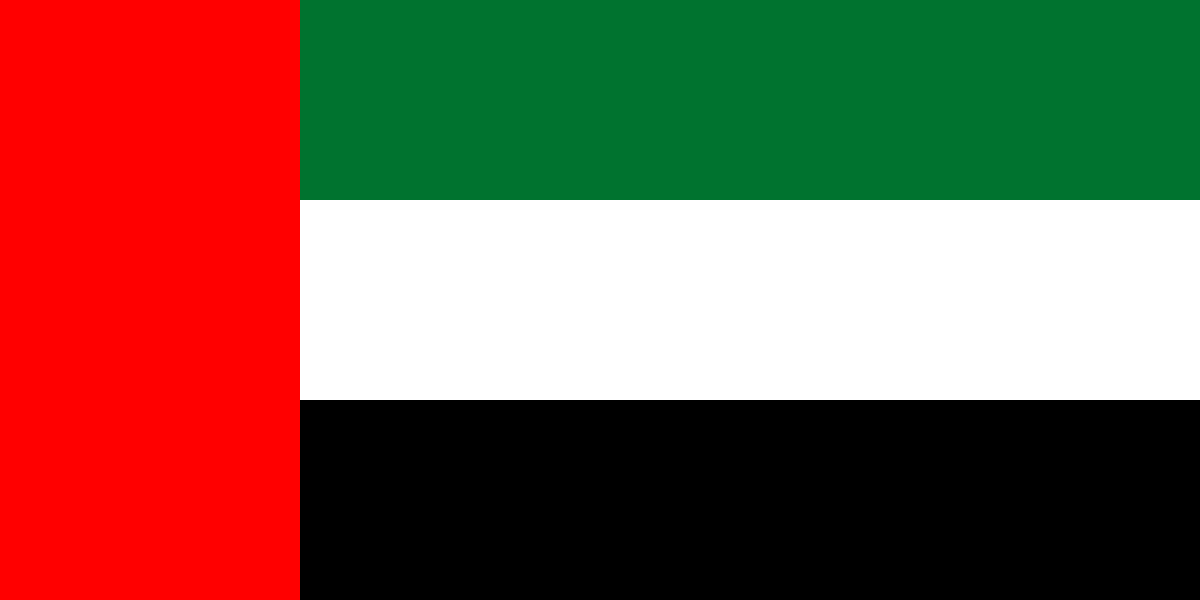The United Arab Emirates flag features three primary colors: Green, White, Black, Red. The table below showcases the common and popular codes for these colors in HEX, RGB, and CMYK formats, along with Pantone (PMS), RAL, and NCS (Natural Color System) references. Remember, HEX and RGB codes are ideal for digital projects and web design (including HTML and CSS), while CMYK values are tailored for printing purposes.
The flag of the United Arab Emirates (UAE) is a vibrant and meaningful symbol representing the unity, heritage, and aspirations of the nation. Here is a detailed description of its design, symbolism, historical context, and overall significance:
Design and Elements
Colors and Layout:
- The flag consists of four colors arranged in a horizontal and vertical pattern.
- A vertical red stripe is located along the hoist side of the flag, occupying one-fourth of the flag’s length.
- The remaining part of the flag is divided into three equal horizontal stripes: green at the top, white in the middle, and black at the bottom.
Proportions:
- The flag’s width-to-length ratio is 1:2.
Symbolism
- Colors:
- Red: Symbolizes bravery, strength, and courage, representing the sacrifices made by previous generations to protect the land.
- Green: Represents hope, joy, and love, as well as the country’s prosperity and the fertility of the land.
- White: Stands for peace and honesty, reflecting the UAE's pursuit of harmony and the country's charitable nature.
- Black: Represents the oil wealth that has fueled the nation’s development, as well as the strength of the people to defend their country against enemies.
Historical Context
Adoption:
- The flag was officially adopted on December 2, 1971, the day the UAE was formed through the unification of seven emirates: Abu Dhabi, Dubai, Sharjah, Ajman, Umm Al-Quwain, Fujairah, and later Ras Al Khaimah.
Designer:
- The flag was designed by Abdullah Mohammed Al Maainah, who was only 19 years old at the time. His design was chosen from over 1,000 submissions in a national competition.
Historical Roots:
- The colors of the flag are derived from the Pan-Arab colors, which are significant in the Arab world and represent Arab unity and independence.
Overall Significance
The flag of the UAE is a powerful symbol of national pride, unity, and progress. It reflects the collective identity of the Emirati people and their shared aspirations for peace, prosperity, and development.
Cultural and National Identity
The flag serves as a unifying emblem for the citizens of the UAE, symbolizing the federation of the seven emirates and their collective identity. It is prominently displayed during national holidays, official ceremonies, and international events, representing the UAE’s sovereignty and its achievements on the global stage.
Unique Features
- Pan-Arab Colors:
- The use of the Pan-Arab colors connects the UAE to a broader Arab heritage, emphasizing solidarity with other Arab nations.
- Vertical and Horizontal Stripes:
- The combination of vertical and horizontal stripes creates a distinctive and balanced design that is unique among national flags.
Historical Significance
Formation of the UAE:
- The flag represents the historic moment of the UAE’s formation, marking the unification of the emirates into a single nation.
- It symbolizes the vision of the founding fathers, particularly Sheikh Zayed bin Sultan Al Nahyan, who played a crucial role in the establishment of the federation.
Modernization and Development:
- The flag reflects the UAE’s rapid modernization and development over the past decades, highlighting its achievements in various fields such as economy, infrastructure, and international diplomacy.
In summary, the flag of the United Arab Emirates is a symbol of national unity, pride, and progress. It encapsulates the country’s heritage, the sacrifices of its people, and their collective aspirations for a prosperous and peaceful future. The flag stands as a testament to the UAE’s achievements and its commitment to maintaining its cultural identity while pursuing modernity and development.
